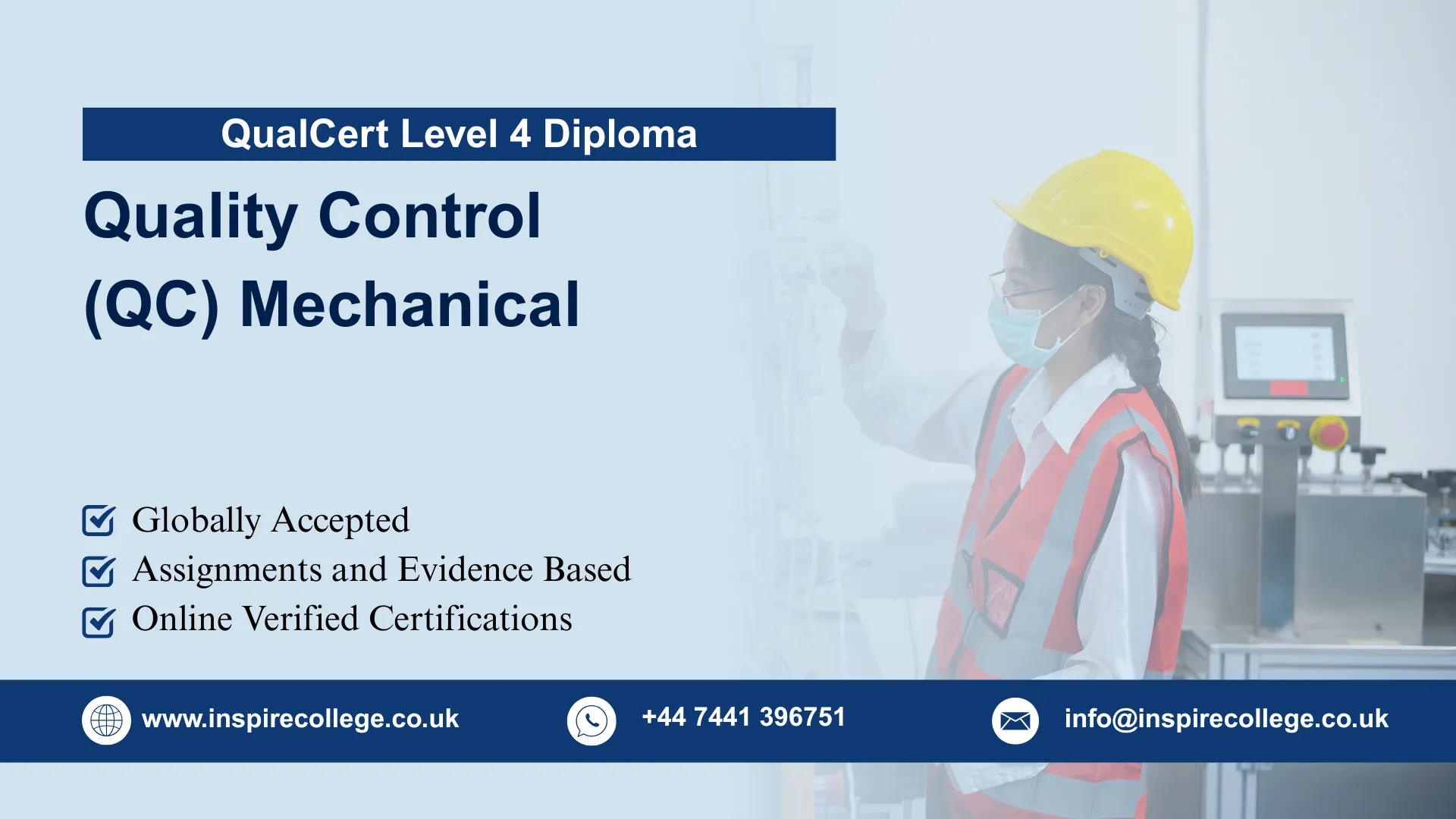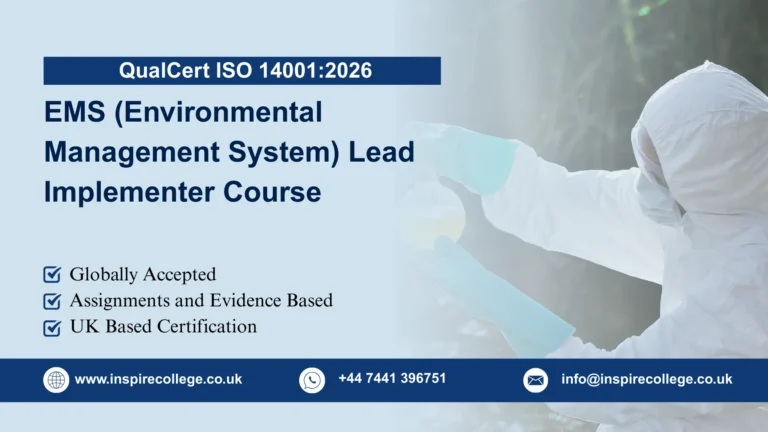
QualCert Level 4 Diploma in Quality Control ( QC ) Mechanical
Maintaining high standards of mechanical quality control is crucial for ensuring product reliability, safety, and operational efficiency in modern manufacturing and engineering industries. The QualCert Level 4 Diploma in Quality Control (QC) Mechanical is designed to provide learners with a strong foundation in mechanical quality assurance, equipping them with the knowledge and practical skills needed to monitor, assess, and improve mechanical systems and production processes.
QualCert Level 4 Diploma in Quality Control ( QC ) Mechanical covers key areas such as mechanical inspection and testing, process control, error detection, and quality optimization strategies. Learners will gain hands-on experience in using quality control tools, performing mechanical system evaluations, and implementing standardized procedures to enhance product performance. The course emphasizes both theoretical understanding and practical applications, ensuring learners can translate classroom knowledge into real-world quality control solutions.
Participants will also develop essential skills in data analysis, problem-solving, and compliance with international mechanical quality standards such as ISO, ASME, and ASTM. By the end of QualCert Level 4 Diploma in Quality Control ( QC ) Mechanical, learners will be capable of identifying defects, assessing system reliability, and applying corrective actions to maintain high-quality standards in mechanical engineering operations.
The QualCert Level 4 Diploma in QC Mechanical is ideal for aspiring mechanical engineers, quality assurance technicians, and technical professionals aiming to establish a career in quality control. Graduates will emerge with a recognized qualification, practical expertise, and the confidence to contribute to operational excellence, support process improvements, and uphold industry best practices in mechanical quality control.
To ensure candidates are fully prepared for the QualCert Level 4 Diploma in QC Mechanical, the following entry requirements are recommended. These requirements are designed to provide a strong foundation for learning and to ensure that participants can fully engage with the course content and practical applications.
Educational Background
- Applicants should hold a minimum of a high school diploma, secondary school certificate, or an equivalent qualification in mechanical engineering, industrial engineering, manufacturing, or a closely related field.
- Candidates with professional certifications, introductory diplomas, or foundational courses in engineering, quality control, or related disciplines may also be considered.
- Completion of related courses, such as the QualCert Level 3 Diploma in Quality Control (QC) Mechanical or other foundational quality control programs, is highly advantageous, as it equips learners with prior knowledge and a stronger understanding of mechanical QC principles.
Age Requirements
- Candidates should be at least 18 years of age to enroll in this program.
- The course is tailored for early-career professionals who are eager to establish expertise and build a career in mechanical quality control.
Professional Experience
- Relevant experience in mechanical engineering, manufacturing, industrial operations, or quality control is beneficial but not mandatory.
- Practical exposure to mechanical systems, production processes, or quality assurance practices significantly enhances the learner’s ability to apply theoretical concepts in real-world scenarios.
Technical Skills
- A basic understanding of mechanical systems, engineering principles, and production processes is essential for engaging with course content effectively.
- Familiarity with quality control tools, inspection methods, and basic data analysis techniques is advantageous and helps learners navigate practical exercises and assessments.
- The ability to interpret technical data, identify issues, and implement quality control measures ensures learners can apply their knowledge in industrial and mechanical settings.
Motivation and Commitment
- Learners should demonstrate a genuine interest in pursuing a career in mechanical quality control and quality assurance.
- Commitment to completing all coursework, practical exercises, and assessments is essential for success.
- A willingness to apply theoretical knowledge to real-world mechanical QC challenges and contribute to operational improvements is highly valued.
This structured and comprehensive set of entry requirements ensures that learners are well-prepared to gain maximum benefit from the Level 4 Diploma. It also lays a strong foundation for further studies and professional advancement, including progression to the QualCert Level 5 Diploma in Quality Control (QC) Mechanical, enabling learners to develop advanced skills and take on more strategic roles in mechanical quality management.
Mandatory Units
The QualCert Level 4 Diploma in Quality Control ( QC ) Mechanical comprises several study units designed to provide learners with a comprehensive understanding of QC principles and practices in the mechanical sector. Below is the qualification structure, including the Total Qualification Time (TQT) 450, Guided Learning Hours (GLH) 270, and 72 Credits associated with the program.
- Advanced Mechanical Quality Control and Regulatory Compliance
- Digital Inspection Technologies in Mechanical Engineering
- Material Testing and Performance Analysis
- Lean Manufacturing and Six Sigma in Mechanical QC
- Risk Management and Quality Failures in Mechanical Systems
- Quality Management Systems (QMS) and Auditing in Mechanical Engineering
The QualCert Level 4 Diploma in Quality Control (QC) Mechanical is designed to equip learners with practical skills, technical expertise, and industry-relevant knowledge to excel in mechanical quality assurance roles. Upon completing this program, learners will be able to implement advanced quality control strategies, utilize digital inspection technologies, and ensure compliance with international mechanical standards. These outcomes are aligned with global education standards and industry best practices, ensuring measurable and applicable competencies for professional advancement.
Advanced Mechanical Quality Control and Regulatory Compliance
- Understand and apply international mechanical quality standards, including ISO, ASME, and ASTM.
- Implement compliance procedures to meet regulatory requirements in mechanical engineering projects.
- Develop systematic approaches to monitor and improve mechanical quality in industrial operations.
- Evaluate quality control processes to identify areas for improvement and ensure adherence to regulations.
Digital Inspection Technologies in Mechanical Engineering
- Utilize advanced digital inspection tools and techniques for evaluating mechanical systems.
- Interpret data from digital measurements to identify defects and assess component performance.
- Apply non-destructive testing (NDT) methods to ensure mechanical integrity.
- Integrate digital inspection outputs into quality assurance reports and decision-making processes.
Material Testing and Performance Analysis
- Conduct mechanical material tests to determine properties such as strength, durability, and resilience.
- Analyze test results to predict material behavior under operational conditions.
- Apply performance analysis techniques to improve product reliability and manufacturing efficiency.
- Recommend corrective measures based on material testing outcomes to optimize system performance.
Lean Manufacturing and Six Sigma in Mechanical QC
- Apply Lean and Six Sigma principles to streamline mechanical production processes.
- Identify waste, inefficiencies, and quality bottlenecks in manufacturing workflows.
- Implement process improvement initiatives to enhance product quality and operational efficiency.
- Monitor process performance using quantitative methods to achieve continuous improvement.
Risk Management and Quality Failures in Mechanical Systems
- Identify potential risks and failure points in mechanical systems and processes.
- Perform root cause analysis to determine underlying causes of quality failures.
- Develop and implement risk mitigation strategies to prevent future defects.
- Monitor the effectiveness of corrective actions and adjust QC processes accordingly.
Quality Management Systems (QMS) and Auditing in Mechanical Engineering
- Understand the structure and functions of quality management systems in mechanical industries.
- Conduct internal and external audits to evaluate compliance with QMS standards.
- Develop clear, structured QC documentation and reporting practices.
- Use auditing outcomes to implement improvements and maintain consistent quality performance.
Upon successful completion of the QualCert Level 4 Diploma in QC Mechanical, learners will have gained the knowledge, skills, and practical experience necessary to manage quality control processes effectively, implement compliance strategies, and contribute to operational excellence in mechanical engineering and industrial environments. Graduates will be well-prepared to advance their careers in quality assurance, technical management, and process optimization.
The QualCert Level 4 Diploma in Quality Control (QC) Mechanical is designed for individuals who aim to build a strong foundation in mechanical quality assurance and advance their careers in industrial and manufacturing environments. This course is ideal for learners who are motivated to develop practical skills, gain technical expertise, and understand regulatory compliance in mechanical quality control.
Ideal learners include:
- Mechanical Engineers and Technical Professionals
- Early-career engineers seeking to strengthen their understanding of mechanical systems, inspections, and quality control processes.
- Professionals aiming to implement standardized QC procedures, enhance reliability, and contribute to operational excellence.
- Quality Assurance and QC Technicians
- QA or QC technicians looking to formalize their knowledge and gain a recognized qualification in mechanical quality control.
- Learners seeking practical experience in material testing, process analysis, and auditing within industrial environments.
- Industrial and Manufacturing Professionals
- Professionals working in production, manufacturing, or industrial operations who wish to specialize in quality assurance practices.
- Individuals aiming to improve workflow efficiency, minimize defects, and support compliance with international standards.
- R&D and Innovation Specialists
- Technical staff involved in research and development projects who want to integrate quality control strategies into mechanical system design and testing.
- Learners interested in leveraging modern inspection technologies and process improvement methodologies to enhance product performance.
- Aspiring Leaders in Mechanical QC
- Professionals planning to progress into supervisory or managerial roles in mechanical quality control.
- Learners motivated to oversee QC teams, conduct audits, and ensure adherence to industry best practices.
This course is perfect for individuals seeking to gain a comprehensive understanding of mechanical quality control, develop practical skills in inspections, risk management, and process optimization, and position themselves for career growth in technical, supervisory, or specialized roles within the mechanical engineering and manufacturing sectors.
Register Now
QualCert Level 4 Diploma in Quality Control (QC) Mechanical






